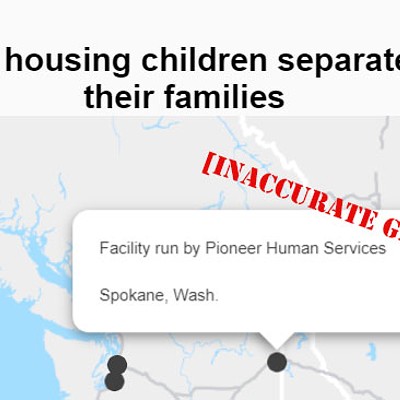Monday, June 25, 2018
Audit finds no evidence that Spokane juvenile court notified schools of student crimes
When a student commits a crime, state law says that juvenile courts are supposed to notify public school principals.
But until recently, Spokane County Juvenile Court kept no record to show it had sent schools any notifications at all.
"They didn't have any documentation that we could use to verify they sent notifications," says Lori Garretson, lead performance auditor for the Washington State Auditor's Office.
That's important, Garretson says, because the proper notifications can ensure school safety and help schools smooth the student's return to class.
Garretson led the audit, which looked into the issue of student crime notifications among juvenile courts in Washington. The audit sampled 10 of the state's judicial districts, including Spokane. Spokane was one of two judicial courts audited that failed to record any notifications to schools regarding student offenses.
That doesn't necessarily mean it didn't send them, Garretson says. And Spokane County Juvenile Court, for its part, said it did send notifications, it just didn't retain the documentation to prove it. State law does not require courts to retain the documentation, but keeping a record of notifications could protect the court from a potential lawsuit.
Since the audit, Garretson says, the court has changed that.
"They were very prompt to take corrective action," Garretson says.
The audit looked at data from 2016. It identified more than 330 types of offenses that would require courts to contact school principals. That adds up to an estimated 10,000 notifications per year in the state.
Overall, the courts audited in the state could prove they made notifications to schools about student offenses just 51 percent of the time. In 29 percent of cases, no documentation was kept to verify notifications were sent. Those figures do not include Spokane or the other court that didn't keep records at all.
"The audit found a number of ways notification processes can break down and significant opportunities for improving the flow of information about students who have committed criminal offenses," the report says.
This is the first time the Auditor's Office has looked at this issue, specifically, says Garretson. She says they chose to look into this process because the Auditor's Office "received personal communication that indicated some gaps in overall processes." There was also concern following a court case in which school personnel in Bethel School District were unaware that a student was a registered sex offender. That student then raped another 14-year-old student.
The reasons for juvenile courts not notifying principals about student offenses vary. Lack of staff training contributed to the gaps, the report says. The courts have since committed to improving training and monitoring.
Garretson says this is just the first audit looking at the issue of notification of student criminal offenses. While this audit focused on the court sending information to schools, the next will cover whether or not schools have records of receiving notifications.
The audit report recommends that the state Legislature formalize a workgroup of stakeholders that already began meeting during the course of the audit in order to streamline the process.
You can view the full report here.
But until recently, Spokane County Juvenile Court kept no record to show it had sent schools any notifications at all.
"They didn't have any documentation that we could use to verify they sent notifications," says Lori Garretson, lead performance auditor for the Washington State Auditor's Office.
That's important, Garretson says, because the proper notifications can ensure school safety and help schools smooth the student's return to class.
Garretson led the audit, which looked into the issue of student crime notifications among juvenile courts in Washington. The audit sampled 10 of the state's judicial districts, including Spokane. Spokane was one of two judicial courts audited that failed to record any notifications to schools regarding student offenses.
That doesn't necessarily mean it didn't send them, Garretson says. And Spokane County Juvenile Court, for its part, said it did send notifications, it just didn't retain the documentation to prove it. State law does not require courts to retain the documentation, but keeping a record of notifications could protect the court from a potential lawsuit.
Since the audit, Garretson says, the court has changed that.
"They were very prompt to take corrective action," Garretson says.
The audit looked at data from 2016. It identified more than 330 types of offenses that would require courts to contact school principals. That adds up to an estimated 10,000 notifications per year in the state.
Overall, the courts audited in the state could prove they made notifications to schools about student offenses just 51 percent of the time. In 29 percent of cases, no documentation was kept to verify notifications were sent. Those figures do not include Spokane or the other court that didn't keep records at all.
"The audit found a number of ways notification processes can break down and significant opportunities for improving the flow of information about students who have committed criminal offenses," the report says.
This is the first time the Auditor's Office has looked at this issue, specifically, says Garretson. She says they chose to look into this process because the Auditor's Office "received personal communication that indicated some gaps in overall processes." There was also concern following a court case in which school personnel in Bethel School District were unaware that a student was a registered sex offender. That student then raped another 14-year-old student.
The reasons for juvenile courts not notifying principals about student offenses vary. Lack of staff training contributed to the gaps, the report says. The courts have since committed to improving training and monitoring.
Garretson says this is just the first audit looking at the issue of notification of student criminal offenses. While this audit focused on the court sending information to schools, the next will cover whether or not schools have records of receiving notifications.
The audit report recommends that the state Legislature formalize a workgroup of stakeholders that already began meeting during the course of the audit in order to streamline the process.
You can view the full report here.
Tags: spokane , spokane judicial district , juvenile court , spokane county juvenile court , student offenses , student crime , News , Image

















